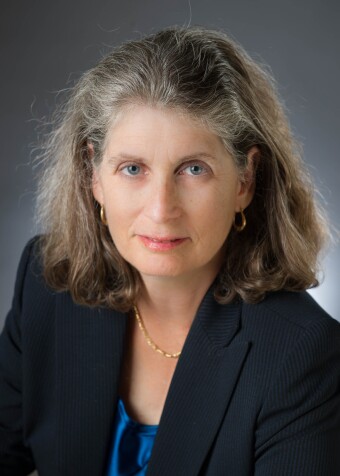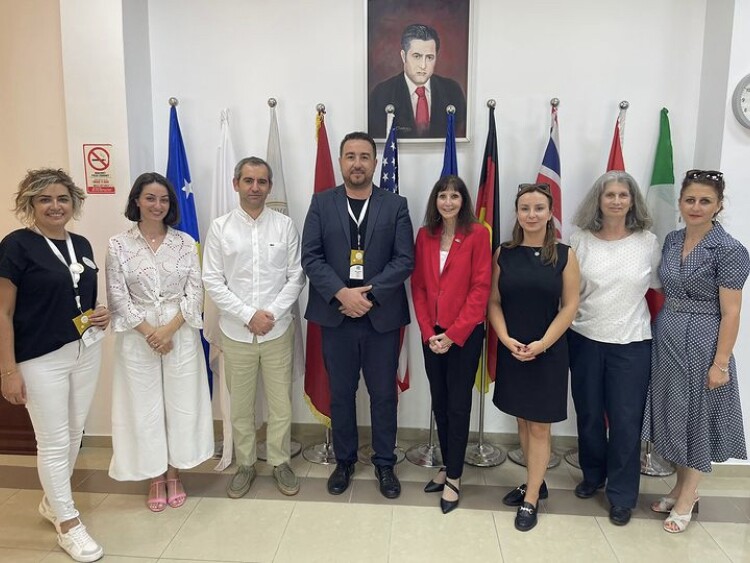Jaime Rubin: Advancing Research Careers at Every Stage

Jaime Rubin was inducted into Sigma Pi Sigma at the Cooper Union for the Advancement of Science and Art in 1976.
Photo courtesy of Columbia University.
As a young girl, Jaime Rubin asked her father for a science kit. He was supportive, though the request elicited serious discussion at the time. “It was a lot different back then,” she says, recalling that the kit came with hazardous chemicals, an alcohol lamp, and other questionable components. “A seven-year-old with an open flame,” she says with a laugh.
But Rubin’s interest in science had been ignited, and in high school she became interested in physics. She went on to major in physics as an undergraduate, first at the University of Albany and then at the Cooper Union for the Advancement of Science and Art in Manhattan. While there, Rubin became interested in the biological effects of radiation. Her advisor was A. Aaron Yalow, a senior faculty member in the physics department. Through Yalow, Rubin got an internship at the Bronx Veterans Administration Hospital with Yalow’s wife, Rosalyn Yalow, who was researching the medical applications of radioactive isotopes. “The following year, she won the Nobel Prize,” Rubin says.
After graduation, Rubin continued her research into the biological effects of radiation. As a graduate student in radiation biology, and molecular and cell biology at the University of Toronto, she was responsible for the first molecular identification and characterization of a human DNA repair gene. “My physics background helped because it allowed me to think about the problem very quantitatively,” she says. “Someone without this perspective might not have realized how massive the experiment had to be.”
Around that time, the field of research administration was in its early stages and positions included multidisciplinary responsibilities in compliance, research development, and other areas that are largely separate roles today. That appealed to Rubin. “I could be involved in every aspect,” Rubin says. “It was really very rewarding.”
Rubin began a position in research administration at Columbia University in New York, where today she is a professor and vice chair for investigator development in the Department of Medicine at Columbia University Irving Medical Center. In this role, Rubin supports junior researchers at every career stage while also being involved in research administration, research compliance, and ethics. She identifies grant opportunities for students and faculty, and has developed courses on best practices for success when applying for funding to support research groups.
“It’s tremendously gratifying to work with very smart people at all different career stages and to help them advance,” she says. “They’re very dedicated, but no one is born knowing how to write a competitive grant application. There’s a knowledge base and skill set that one has to acquire.”
And that’s where Rubin comes in. In four years, she helped Columbia’s Department of Medicine rise from 14th place in funding from the federal National Institutes of Health (NIH) to second in the nation in 2018. Today the department remains among the top five for NIH funding nationwide. “It’s a matter of putting the many pieces together with the support of senior leadership and the faculty, thus enabling the department to become and maintain an extremely research-focused and research-intensive enterprise,” she says.
Rubin’s advice to students: say yes to everything. “Stay flexible and look for new opportunities,” she says. “Answer every email, reach out, volunteer for things. You never know how an individual activity is going to turn out or where it will lead.”
Rubin recently took her own advice when by chance she came across a special Fulbright Scholar Award for which she was ideally qualified—working on initiatives related to faculty and research development with the Republic of Kosovo’s Ministry of Education, Science, Technology, and Innovation. Rubin applied for the award and in 2023 spent six months in Kosovo, where in addition to supporting funding programs for university investigators, she gave talks on faculty development, research development, and the Fulbright program itself. She even reviewed grant applications for the US Embassy.
“I just said yes to everything,” she says. “Individuals really can make a difference.”

While in Kosovo, Rubin (second from right) spoke about her Fulbright experiences in a presentation to students in the International Summer School at the University of Prizren. Also pictured are the University president, senior faculty, and staff from the US Embassy and the United States–Kosovo Educational Exchange Board.
Photo courtesy of the University “Ukshin Hoti” Prizren.




